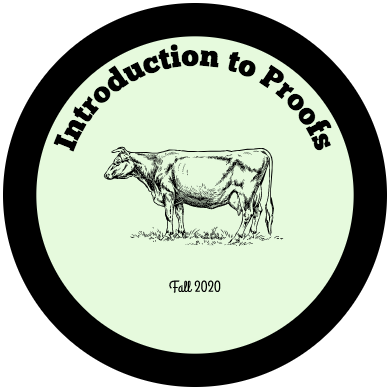Course Information
Course Number: MAT 2571
Equivalent to old course number MAT 2070 or MAT 2071.
Course Title: Introduction to Proofs
Course Description: Preparation for teaching an advanced mathematics curriculum with a focus on the processes of mathematical argumentation and reasoning, deduction, and discovery. Topics include propositional and first-order logic, axiomatic approach to number theory, set theory and abstract properties of relations, with a particular emphasis on number theory.
Credits / Hours: 4
Section Number: D700
Pre- or Corequisite: MAT 1575 Calculus II
Textbook: Book of Proof. Edition 3.2. Hammack, R. (2009). Creative Commons Attribution – No Derivative Works 3.0. The textbook is available here (free download or purchase hard copy).
Online Spaces
- OpenLab: This website will be the online home for our class. The site contains important information about the course, and will be used in various ways throughout the semester.
- WeBWorK: Part of the homework for this class will be completed on the WeBWorK system. You will be provided with more information in the first week of class.
- Zoom: Synchronous meetings of the class (when we meet live in real-time) will take place on Zoom. Zoom info will appear on the Contact Info & Communications page (passwords will be distributed by email).
Statement on Zoom recordings of synchronous class meetings:
Students who participate in this class with their camera on or use a profile image are agreeing to have their video or image recorded solely for the purpose of creating a record for students enrolled in the class to refer to, including those enrolled students who are unable to attend live. If you are unwilling to consent to have your profile or video image recorded, be sure to keep your camera off and do not use a profile image. Likewise, students who un-mute during class and participate orally are agreeing to have their voices recorded. If you are not willing to consent to have your voice recorded during class, you will need to keep your mute button activated and communicate exclusively using the “chat” feature, which allows students to type questions and comments live.
Faculty Information
Professor Name:
- Jonas Reitz
Office Hours/Information: For information about office hours, visit Contact Info & Communications.
Contact Information
- Email: jreitz@citytech.cuny.edu
- Phone: 718-260-5380 (this is *not* the best way to reach me – instead, send me an email or leave me a message on the OpenLab)
Learning Outcomes
- Students will be able to evaluate truth of statements in propositional and first order logic.
- Students will be able to understand and use formal reasoning methods.
- Students will be able to recognize the role of sets in mathematics.
Gen Ed Learning Outcomes
Students will be able to:
- Gather, interpret, evaluate, and apply information discerningly from a variety of sources.
- Employ scientific reasoning and logical thinking.
- Acquire tools for lifelong learning.
- Use creativity to solve problems.
- Show curiosity and the desire to learn.
Teaching/Learning Methods
- Lecture and guided discussion
- Student presentations
- Use of online resources
- Writing intensive assignment
Technology Requirements
- None, aside from the basic tools to participate in distance learning (a laptop, tablet, desktop, or other device, with internet connection).
Schedule
A detailed schedule of topics can be found on the Schedule page.
Percent/Letter Grade conversion
A = 93.0 — 100
A- = 90.0 — 92.9
B+ = 87.0 — 89.9
B = 83.0 — 86.9
B- = 80.0 — 82.9
C+ = 77.0 — 79.9
C = 70.0 — 76.9
D = 60.0 — 69.9
F = 0 — 59.9
W = withdrawal up to 11/6/20 (WF after 11/6/20)
Grading Policy
The grading policy for the course appears on the Grading Policy page.
Class Etiquette & Netiquette
Even though this class takes place online, you are expected to observe the same behavior that you would in a normal classroom. Bullying, talking down to others, and foul language will not be permitted. Be honest, be kind.
Attendance/Participation
Attendance and participation are required in this class. However, as this is the first full semester of online teaching at City Tech, the expectations for attendance and participation may be different than you are used to. As a student in this class, you are expected to:
- Attend all synchronous (live, real-time) class activities.
- Complete all assignments and exams.
- Participate in online discussions.
If you find you are unable to complete any of the above, please let me know *as soon as possible*! These are extraordinary times – lets work together to keep the college functioning.
Academic Integrity Policy
Students and all others who work with information, ideas, texts, images, music, inventions and other intellectual property owe their audience and sources accuracy and honesty in using, crediting and citation of sources. As a community of intellectual and professional workers, the college recognizes its responsibility for providing instruction in information literacy and academic integrity, offering models of good practice, and responding vigilantly and appropriately to infractions of academic integrity. Accordingly, academic dishonesty is prohibited in The City University of New York and is punishable by penalties, including failing grades, suspension and expulsion. More information about the College’s policy on Academic Integrity may be found in the College Catalog.
Print this page




Recent Comments